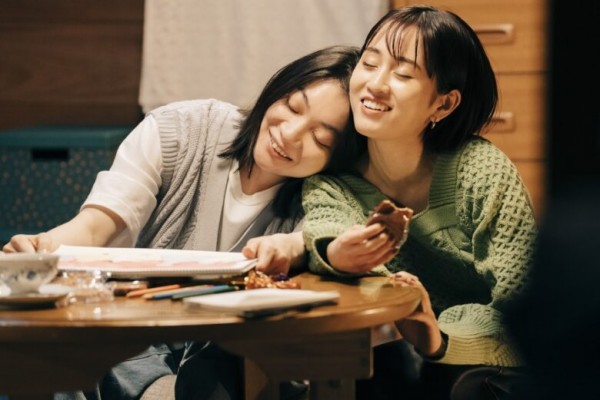SHINYA TAMADA: I AM WHAT I AM そばかす (2022) - JAPAN CUTS JULY 26-AUG. 6, 2023 TOKO MIURA, ATSUKO MAEDA IN I AM WHAT I AMAn anti-romcom: a woman establishing her oddball asexual identity in conformist Japan
TOKO MIURA, ATSUKO MAEDA IN I AM WHAT I AMAn anti-romcom: a woman establishing her oddball asexual identity in conformist Japan Kasumi (Toko Miura of
Drive My Car) is odder than she may at first appear. She's not just lagging behind. She is really different from others: She is asexual, and in addition is unable to have romantic feelings for other people. This film's "journey toward self-acceptance" escapes triteness because this is a rare personality quirk and no easy answers are found. The film comes to terms with itself, as it were, as an oddball piece, a sort of anti-romcom. Tamada's film fits in somewhere, though. It's the third film, following Yuka Yasukawa's 2021
The Nighthawk's First Love and Takuya Kato's 2022
Grown-ups, in a project called "(Not) Heroine Movies" from Nagoya Broadcasting Network designed to subvert female film stereotypes. My only problem with
Am What I Am is that the protagonist never quite won my affection. How does one learn to like someone who lacks feeling? I kept wishing she would find the odd man who won her heart, or discover after all she was gay. But no: her unhappiness, her uncertainty, her outsider status, is symbolized by the recurrent scene where she sits alone on a beach -staring out at the sea. The movie charms, in its offbeat way, with its refusal to conform.
Originally titled そばかす (Sobakasu, "Freckles"), this film is about that very difficult subject in Japanese culture, a person who does not fit in. Worse still, Kasumi is a
woman who doesn't fit in. Even worse than that, she has reached the age of
thirty, and has not married. There are no compensations. She is not a brilliant talent. A music school dropout, she has stopped playing the cello - though her father maintains the instrument just in case. She is working at a crappy job as a clerk in a big call-answering service. She still lives with her family. Problem posed. How will it be solved? Actually it will not exactly be solved. Its "victim" will learn to live with it and so, teach others to do so - and show us that such people exist.
The screenplay progresses in loose, almost improvisational fashion. The home life and job scenes are sketched in. There is a "mixer" or uncommitted double date, but this affair with all its chatter about girl-likes and boy-likes drives Kasumi to flee to a solitary ramen shop. Her mother forces her into an
omiai (arranged marriage interview). Inspiration: she and the guy secretly confer after and she learns he's equally uninterested in marriage, wants to focus on his - ramen shop. They bond for a while.
Kasumi gets away from the call-answering to work in a kindergarten, connecting comfortably with kids. But, ironically, her oddity is highlighted there too, because even the kids form into couples (gay and straight!) barely beyond toddler stage. A coworker feels comfortable telling her he's gay: perhaps her sensed neutrality helps people open up.
Living with family provides more plot, of which this film has no shortage. Her grandmother talks of her four marriages. Her pregnant sister is paranoid about her husband's cheating on her. Her parents' marriage is strained by her mother's insecurity and she discovers that her father is depressed. He wanted to be a a musician. Does Japanese conformity force more people to abandon their dreams, or is this just what happens everywhere? Are happy marriages in very short supply?
A solution is found when Kasumi meets a bright, charming former classmate, Maho (Atsuko Maeda). Here is another woman who's unmarried, and her former having been a porn star marks her as an oddball too. Kasumi and Maho have a great times, even going on a camping trip together. They are going to live together - only to have that hope dashed when Maho reconnects with a former boyfriend and they decide to marry. Maha asks Kasumi, who seems to accept this disappointment philosophically, to be a main speaker at the wedding. Kasumi tells her father she will play the cello - this one last time. (This authentically imperfect performance is somewhat excruciating.)
A key, perhaps overly expository, moment is the special version of "Cinderella" Kasumi crafts for the kindergarten, with a Cinderella who does
not want the prince.
At the end, the film finds a kind of resolution when Kasumi finds, and semi-bonds with, someone like herself, another new kindergarten male coworker, a great comfort to simply know one other asexual, unromantic, friendship-only person exists. He invites her to a movie, then when she warns him she isn't capable of a relationship, he explains why that's fine. He has heard about her version of "Cinderella" and seen they are two of a kind. He wants no relationship either. At the end, she acts out her favorite Tom Cruise sequence, in
War of the Worlds , - the one where he is running
away from something, not toward. That is the way her life is to be.
But hey, this was a cute boy going to the movies with a cute girl. This is a movie: what are you going to do?
I Am What I Am そばかす, 105 min., was screened for this review as part of NYC's
Japan Cuts, where it showed Jul. 28, 2023.





